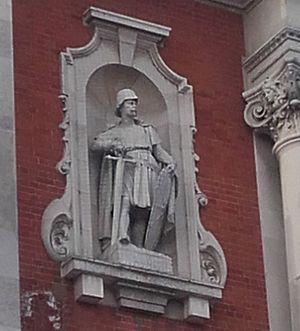Eudo Dapifer facts for kids

Eudo Dapifer (died 1120) was an important Norman nobleman. He worked as a trusted helper, called a "steward" or "dapifer," for three English kings. These kings were William the Conqueror, William II Rufus, and Henry I. Eudo played a big part in the early history of England after the Normans arrived.
Contents
Who Was Eudo Dapifer?
Eudo was the fourth son of Hubert of Ryes. His father was famous for helping Duke William of Normandy (who later became William the Conqueror) escape danger in 1047. Eudo had several brothers: Ralph, Robert, Hubert, William, and Adam. He also had two sisters, Albreda and Muriel.
Eudo was known as "dapifer" because of his job. In Latin, "dapifer" means "steward" or "server." This was a very important role in the king's household.
Eudo's Service in England
Working for William the Conqueror
We don't know for sure if Eudo was at the Battle of Hastings. However, after the Norman Conquest, Eudo, his father, and all his brothers were in England.
Eudo's brother Ralph became the castle commander of Nottingham. Hubert looked after Norwich Castle. Adam helped with the Domesday Survey in 1085. This survey was a huge record of land and property in England.
Eudo himself received land in many areas, including Essex and Hertfordshire. By 1072, he was already a steward in the English royal household. He later inherited more lands from his brothers. Eudo was also involved in building Colchester Castle, which was the largest Norman stone castle built in England at that time. He was in charge of this castle until he died.
Working for William II
Eudo was with King William the Conqueror when he died in Rouen. He then went with the new king, William II of England, to England. Eudo helped King William II secure important royal castles like Dover, Pevensey, and Hastings.
Eudo continued to serve as a steward for William II. He was one of the king's early supporters, signing official documents and working in the royal household. In 1096 or 1097, Eudo started Colchester Abbey and also St Mary Magdalene's Hospital in Colchester. During William II's time, Eudo signed 27 royal orders. Some historians believe Eudo was one of the first "justiciars," who were important royal officials.
Working for Henry I
Eudo continued his role as a steward for King Henry I of England, William II's younger brother, who became king in 1100. Eudo was one of the people who signed Henry's Charter of Liberties, a document issued shortly after his coronation in August 1100. Eudo also witnessed the peace agreement between Henry and his brother Robert Curthose in 1101.
Because of his service to Henry, Eudo gained even more lands, including the town of Colchester itself. He continued to frequently sign royal documents alongside other important officials. In 1103, Eudo's son-in-law, William de Mandeville, had his lands taken away. These lands were then given to Eudo. This punishment was likely because William de Mandeville allowed a prisoner to escape from the Tower of London. King Henry I also made Eudo the new Constable of the Tower of London.
Eudo's Death
Eudo died in Préaux, Normandy, in early 1120. He was buried in the chapter-house of St John's Abbey, Colchester, which he had founded, on February 28, 1120. He left valuable gifts to Colchester Abbey, including the manor of Brightlingsea. There is a statue of Eudo on Colchester Town Hall to honor his service to the town.
Eudo's Family
Eudo married Rohais, who was the daughter of Richard Fitz Gilbert, around 1088. They had one daughter named Margaret. Margaret married William de Mandeville and also Ottiwel d'Avranches. Margaret was the mother of Geoffrey de Mandeville, who became the first Earl of Essex.
 | Tommie Smith |
 | Simone Manuel |
 | Shani Davis |
 | Simone Biles |
 | Alice Coachman |

